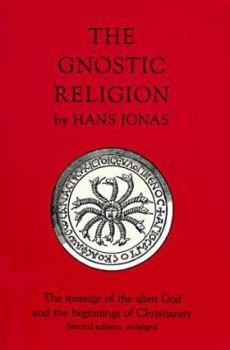Gnostic Religion Txt Pa
Select Format
Select Condition 
Book Overview
The Message of the Alien God and the Beginnings of Christianity This description may be from another edition of this product.
Format:Paperback
Language:English
ISBN:0807057991
ISBN13:9780807057995
Release Date:January 1963
Publisher:Beacon Press (MA)
Length:355 Pages
Weight:0.98 lbs.
Dimensions:1.0" x 5.4" x 8.0"
Customer Reviews
4 ratings
Excellent summary of Gnosis and Gnosticism
Published by Thriftbooks.com User , 18 years ago
Gnosticism was a syncretic religious movement which flourished from the time of St Paul to about 200 AD. The Gnostics were brilliant seekers who like many thoughtful people of the time, were seeking for an answer to the meaning of existence in a turbulent and unstable world addled with war, injustice, evil, and suffering. Jonas offers an excellent examination of the Gnostic religion and the main ideas of Gnosticism, and introductions to the most famous Gnostic teachers (Valentinus and Basilides) and schools. Central to Gnostic thought was escape of the spiritual soul of man from the prison of the material world to the perfect realm of light or the spirit, where an ineffable God of pure light and spirit lived in a perfect universe of spirit-beings. The problem for the Gnostics was how to escape there from the prison of the material world and the body, which was ruled by evil beings whose aim was to keep all trapped here. The Gnostics were great mythmakers and elaborated on the hidden and unseen realms of the spirit in fantastically complex accounts of how the world began with a catastrophe in the realm of the spirit, followed by the attempts of spiritual beings from that realm to heal the rifts in reality and bring the Gnostic to redemption. They were also deeply dualistic and asctetic, regarding childbirth and sex as evils to be avoided. Jonas compares Gnostic thought with schools of philosophy today such as existentialism, which describe man's 'fallen' nature in an imperfect and undesired existence, from which redemption is necessary (but perhaps not possible because of the secular nature of modern society). Readers of this volume should also acquire either Bentley Layton's Gnostic Scriptures or the Nag Hammadi Library, as reading the primary sources is essential to understanding Gnostic thought.
As a Matter of Fact, I Do Have Time
Published by Thriftbooks.com User , 23 years ago
With regard to the review below, I would agree that there are parts of this book that involve swinging the pickaxe. But what's wrong with that? It's a fun activity, and actually causes one to learn things--imagine that! The fact that the prose is densely packed (although never obscure) is part of this book's charm. And the pickaxe usually isn't necessary, due to the overall clarity of the writing. For example, the chapters on the Velentinian speculation and the "Hymn of the Pearl" are magnificently written, and do much to enhance one's understanding of the subjects. As far as the passage you quoted, I would submit that you made it appear much more difficult than it is by omitting the preceding reference to the concept of "theoria." In this very book, Jonas states that, "[t]o look at what is there, at nature as it is in itself, at Being, the ancients called by the name of contemplation, theoria." Theoria is the "there" to which your passage refers. With that in mind, one can see that Jonas is trying to make a point regarding epistemology. The classical notion of knowledge involved the subject's essentially passive observation of Being. Gnosis as viewed by gnostics was a different form of knowledge, one that involved the interaction between subject and object set out in the passage. Most authors merely state that Gnostics sought gnosis (knowledge) and leave it at that. That's what I like about this book. Jonas always takes it to the next level, and leaves you with a thorough understanding of the subject. Swing the pickaxe--it's worth it.
An excellent and incisive overview
Published by Thriftbooks.com User , 24 years ago
Hans Jonas has done a masterful job in this study. Combining a historical overview of the development of the early Gnostic movement with a wonderful analysis of the systems' underlying belief structures, Jonas manages to bring the history and the thought alive for anyone reading his work.A student of Martin Heidegger's, Jonas also has an extremely intriguing essay at the end of this work titled "Gnosticism, Existentialism, and Nihilism" that draws some almost startling parallels between the first few centuries after Christ and the spiritual and intellectual crises that we are confronting in this century.Jonas has a unique ability to combine Germanic thoroughness and rigour with the lucid writing more typical of what comes from scholars and thinkers in the English/American tradition.In short, an indespensable, marvelously engaging work. More than highly recommended reading, it is my favorite book on this subject-- a model of thoughtful and thought-provoking scholarship. If you are "scholastically inclined," and interested in learning about the Gnostics, I can think of no better place to start.
one of the best in gnosticism
Published by Thriftbooks.com User , 24 years ago
As a Gnostic, it was a delight to read this book. Everything I knew and did not know, I found in detail in this book by Jonas.You will find the background on the history of Gnosticism in Alexandria; history on its development; the various contributors (e.g. Babylon, Syria, Greek), the various "systems of thought" (eg Valentinian) and their proponents; and a bit of philosophy on Metaphysics. The excerpts and quotations from ancient Gnostic sources like the Mandaeans tracts and Manichaean books are very helpful and exciting. It is well structured and very easy to follow!A disadvantage is that it tends to overlook the influence of ancient Egyptian mythology of the after-death (regarding the journey of the soul after death), which influeced Gnosticism profoundly! Also it does not mention the Cathars and Catharism. But this should detract nothing from the book, it is a classic and a masterpiece on Gnosticism!






